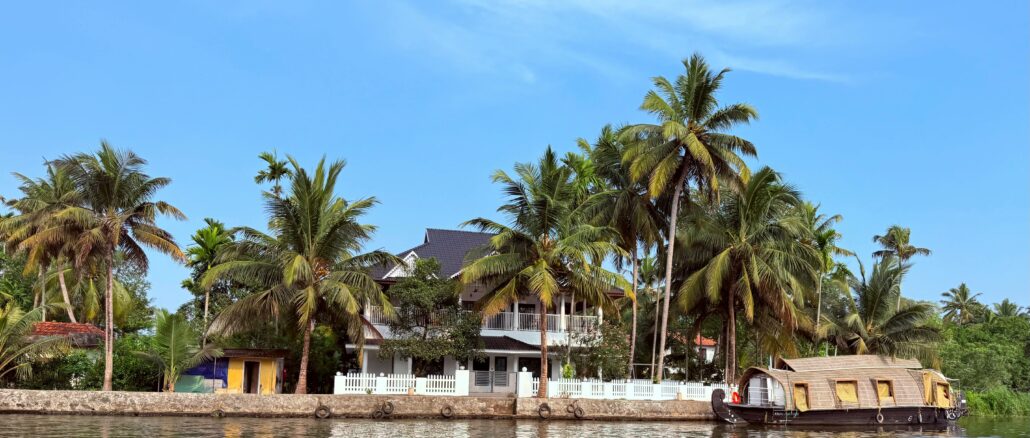
From cultural immersion to eco-friendly living, Homestays Are the Future of Kerala Tourism — redefining travel in God’s Own Country
Introduction: Homestays Leading the Next Chapter in Kerala Tourism
Homestays: The Future of Kerala Tourism lies in the growing desire for authentic, meaningful, and sustainable travel experiences. Unlike conventional hotels, homestays provide travelers with an opportunity to live with local families, share meals, and understand the region’s rich traditions. This personalized model of hospitality fosters genuine human connections and cultural exchange — values deeply embedded in Kerala’s tourism identity.
As travelers increasingly seek immersive experiences, homestays in Kerala have emerged as a perfect blend of comfort, authenticity, and sustainability. They allow guests to go beyond sightseeing and engage with the local lifestyle, creating memories that resonate long after their journey ends.
The Unique Appeal of Kerala: A Destination Made for Homestays
Kerala, often called “God’s Own Country,” is known for its lush backwaters, scenic hill stations, serene beaches, and vibrant culture. The state’s natural and cultural diversity makes it an ideal destination for homestays, where visitors can enjoy the warmth of local hospitality amid breathtaking landscapes.
From exploring the tranquil backwaters of Alleppey to experiencing the spice plantations of Wayanad, Kerala’s charm lies in its simplicity and authenticity. Traditional art forms like Kathakali and Mohiniyattam, along with flavorful dishes such as Kerala fish curry and appam, further enrich travelers’ experiences. Through homestays, visitors gain a deeper connection with these cultural treasures while supporting the families that preserve them.
Economic Benefits of Homestays for Local Communities
Homestays are revolutionizing Kerala’s tourism economy by directly benefiting local households. By converting parts of their homes into tourist accommodations, families generate supplementary income that supports education, health, and livelihood opportunities.
Additionally, homestays inspire entrepreneurship among residents, who expand into offering cultural tours, cooking workshops, and handcrafted souvenirs. This ripple effect boosts local economies, empowering artisans, farmers, and transport providers. The financial sustainability that homestays bring also encourages young Keralites to remain in their hometowns, strengthening rural communities.
Sustainable Tourism: A Green Path for Kerala’s Future
Sustainability lies at the heart of Homestays: The Future of Kerala Tourism. These accommodations often practice eco-friendly methods such as rainwater harvesting, solar power usage, and organic farming. By sourcing food locally and minimizing waste, homestays promote a circular economy that benefits both nature and the community.
Guests who choose homestays contribute directly to preserving Kerala’s fragile ecosystems and cultural heritage. This alignment of responsible tourism and environmental care positions homestays as the cornerstone of Kerala’s sustainable tourism strategy.
Personalized Travel Experiences: The Human Touch in Tourism
Homestays offer travelers a deeply personal experience that hotels cannot match. Hosts curate activities tailored to each guest’s interests — from spice garden visits and cooking classes to traditional dance performances and village walks.
These customized experiences create emotional connections between hosts and visitors, turning a stay into a cultural journey. For many travelers, learning to prepare Kerala-style dishes or participating in local festivals becomes the highlight of their trip — a reflection of how personal connections define the new era of tourism.
Challenges and Opportunities in Kerala’s Homestay Sector
Despite their success, homestays face challenges such as complex regulations, competition from hotel chains, and the need for consistent quality standards. Ensuring hygiene, safety, and marketing visibility also remain key concerns.
However, opportunities abound. The rise of digital nomadism, wellness travel, and eco-tourism presents homestays with a chance to redefine Kerala’s hospitality landscape. By maintaining authenticity and adopting smart digital strategies, homestays can appeal to global travelers seeking meaningful stays.
Technology Empowering Homestay Growth in Kerala
Digital transformation is accelerating the success of homestays across Kerala. Online booking platforms such as Airbnb and Booking.com, along with social media marketing on Instagram and Facebook, have amplified visibility for local hosts.
Through storytelling, visuals, and customer reviews, technology allows homestays to connect with a global audience. Mobile apps and digital payment systems simplify bookings and communication, ensuring a seamless guest experience while empowering local hosts to thrive in a competitive tourism market.
Success Stories: Inspiring Homestays in Kerala
Kerala’s homestays have become shining examples of sustainable and guest-centric tourism.
Eden Homestay in Alleppey offers guests immersive experiences like paddy field tours and traditional meals prepared from local produce.
Pepper Grove Homestay in Wayanad emphasizes eco-friendly living, where visitors learn about spice cultivation and traditional cooking.
These success stories highlight how homestays can deliver both memorable guest experiences and tangible community benefits.
Conclusion: Homestays – The Future Backbone of Kerala Tourism
The rise of Homestays: The Future of Kerala Tourism marks a transformative shift toward sustainable, people-centered travel. By blending authentic cultural experiences with environmental and economic responsibility, homestays strengthen Kerala’s identity as a global model for responsible tourism.
As Kerala continues to embrace this model, the future looks bright — one where tourism thrives in harmony with culture, community, and nature.

